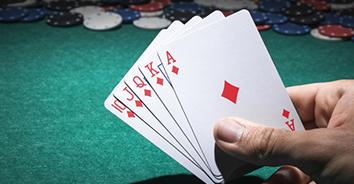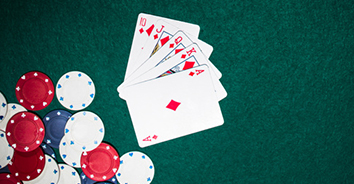 Playing cards has always been a common affair in India during free time, festive seasons, as well as during family gatherings and social events. And Rummy happens to be one of the most played card games during these special occasions.
Playing cards has always been a common affair in India during free time, festive seasons, as well as during family gatherings and social events. And Rummy happens to be one of the most played card games during these special occasions.
The game of Rummy has been around for more than a century, but it was only until recently that it experienced unprecedented growth in the country. This increase in popularity was due to the advent of online platforms which allow players to play games from the comfort of their home. Also, these online sites make it possible for passionate players from across geographical boundaries to compete against each other.
For players who are new to the game, we’ve created this ultimate guide that details everything one needs to know about the game. The article takes a look at the objective of Rummy, the common terminology, how to play online, the popular Rummy variations and many more things. Read on!
What's on page
The objective of Rummy

The objective of the game is to arrange all the 13 cards invalid sequences and sets. To win at a Rummy game, you need to form at least two sequences, out of which one must be a pure sequence and rest can be any valid sequence or sets i.e. sequence with or without joker. Remember that it’s not possible to make a valid Rummy declaration without a sequence. This is one of the most important rules of the game.
Forming sequences
In Rummy, a sequence consists of three or more cards of the same suit. There are two types of sequences that are formed in this card game – a pure sequence and an impure sequence. To win at the game of Rummy, you must have at least one pure sequence in your hand.
Pure sequence
A pure sequence refers to a group of three or more consecutive cards of the same suit. A pure sequence is formed without a joker or wild card.
Examples of pure sequence
- Diamond suit cards with a printed value of 2, 3 and 4. (A pure sequence with a minimum of three consecutive cards of the same suit. Note that no joker card or the wild card has been used).
- Heart suit cards with a printed value of 2, 3, 4 and 5. (A pure sequence with more than three consecutive cards of the same suit. Again, the sequence has been formed without a joker card or wild card).
Impure sequence
An impure sequence is a group of three or more consecutive cards of the same suit with one or more jokers used.
Examples of impure sequence
- A set of diamond suit cards with face values 2, 3 and 4, followed by Q hearts. Here, the Q of hearts acts as a joker that replaces the 5 of diamonds. This completes the sequence of 2, 3, 4 and 5 of diamonds.
- A set of heart suit cards with face values 3, 5 and 6, followed by K of clubs and a printed joker. Here, the King of clubs acts as a joker to replace 4 of hearts and the printed joker card replaces the 7 of hearts to form a complete sequence of 3, 4, 5, 6 and 7 of hearts.
How to form sets in Rummy?
A set is a group of three or more consecutive cards that have the same value but could belong to different suits. When forming a set, the player gets the option to use joker cards or wild cards.
Examples of sets in the game:
- Ace cards of diamonds, hearts and spades (set of three cards with the same face value but belong to different suits).
- 5 of diamonds, clubs, hearts and spades (set of four cards of different suits).
- Queen cards of hearts, spades, clubs and diamonds (again, set of four cards with the same value but of different suits).
- King cards of spades, clubs and hearts, followed by queen of hearts (here the queen of jokers acts as a joker).
- 7 of diamonds and spades, followed by a king of hearts and a printed joker (the jokers are used to form the set).
Popular Rummy variations you should try
When playing Rummy games online, there are numerous variations for you to try. Here’s a look at the most popular variants available online:
13 Card Rummy
Also known as Indian Rummy, 13 Card is a popular variant of the game. 13 Card Rummy is played between 2 and 6 players, and each player is dealt with 13 cards in the game. As a player, your objective is to arrange the cards in valid sets and sequences by picking and discarding cards. The game also allows the use of joker cards, which can be used as substitutes for missing cards while forming sets or sequences.
To make a valid declaration, you need to have one compulsory sequence along with an impure sequence or sets. This format has mainly 3 variations – Points Rummy, Deals Rummy and Pool Rummy. Let’s explore them one by one:
Points Rummy
Also referred to as 80 Points, this is the simplest and most basic format of 13 Cards. A session of this format of Rummy lasts for only a few minutes, which makes it an ideal choice for novice players. In 13 Cards Rummy, players play for points with a pre-decided Rupee value against each point. Once a player declares in the game, the points of the player are calculated based on the points accumulated by the losing players.
Rules you need to know
- Each Points Rummy game lasts for 1 deal only.
- Rummy points have a Rupee value that is determined at the start of the game.
- In this format, a penalty is charged every time you drop out of the game. Players who opt to drop at the start of the game, also known as the First Drop, will get 20 Points. The players who choose to leave the game before the game show (make a Middle Drop) will get 40 Points. Any player who does not meld the card at the time of a show instead opts to drop out of the game will get 80 points.
- If you opt to leave during the game, Penalty = Full Count X Entry Fee will be deducted.
- Calculation of winnings: Winning cash = (sum of all points of opponents) x (rupee value of the point) – operator fee.
Deals Rummy
Deals Rummy is another popular format of 13 Card that is played with chips. The chips are given to each player at the start of each game, and all players need to pay an entry fee to enter the game. In Deals Rummy, the winner receives the chips of the player who is losing at the end of each deal. When all the deals are over, the player who has the maximum number of chips wins the game.
Rules for calculating winnings in Deals Rummy
As with many other formats of Rummy, the players need to arrange all the cards in their hand as per sequences and/or sets. To win, the players need to form a minimum of two sequences, out of which one must be a pure sequence. Once done with this, one card needs to be discarded to the finish slot to declare the sequences and sets.
Note that the number of chips in Deals Rummy is based on the number of deals you play. For instance, if two players opt to play for 2 deals, then the number of maximum points (80) is multiplied by 2. That way, 160 chips are given to each player at the beginning of each game.
At the ends of each deal, the winner gets all chips from the losing players. Once all deals get over, the players are allotted ranks based on their chip count. The player with the highest number of chip counts gets the highest rank. In case of a tie between players, the player with the equal chip amount needs to play a tiebreaker game to decide the winner.
Pool Rummy
In Pool Rummy, all players collect or ‘pool in’ money to play the game. It is quite similar to the Points Rummy game, except that all players barring one gets eliminated from the game on collecting the required points. The player who is left wins the game.
Pool Rummy has another two versions – 101 and 201 Pool Games.
101 Pool Rummy – Here, a player needs to drive the opponents to cross 101 points. As soon as a player collects 101 points, he/she has to accept defeat and drop out of the game.
201 Pool Rummy – In this format, all the players get eliminated as soon as they collect 201 points. Here, only one winning player remains at the end.
The winnings in Pool Rummy are calculated as, Winnings = (entry fee) x (number of players) – operator fees.
Common terminologies you need to know
Now that you know the different Rummy variations and how to play online, here’s a look at the common terminologies that will help you in the game:
Table
It refers to the place where you play the Rummy card game. Every table can sit two to six players in a game.
Deck of cards
A deck of cards is the standard pack of 52 cards that has 13 cards from the Heart, Diamond, Clubs and Spades suits.
Buy-in
It refers to the money one needs to pay in order to take part in a tournament of real money Rummy games.
Sorting
Sorting is arranging your cards in such a way that it helps you form sequences and sets and avoid the mixing of cards. Sorting is done at the start of each game.
Joker
A joker is a randomly selected card at the start of each game. A joker can be used as any card in that particular game.
Printed joker
Besides the 52 cards of 4 suits, there are two or three printed jokers in a standard pack of 52 cards. This printed joker can also be used as any card in the game.
Shuffle
After every game, the dealer needs to mix the cards well before dealing with the next game. This mixing of cards is called the shuffling of cards.
Closed deck
The closed-deck refers to a pack of cards that remain un-dealt by the dealer. The closed-deck cards are placed face-down on the table.
Open deck
The open deck refers to the cards that are discarded by the players in a game.
Dealer
The player who deals the cards at the start of every hand in is called the dealer in this card game.
Discard
During your turn in the game, you need to draw a card from the closed or open deck and then place a card facing up on the open deck. This process of placing a card on the open deck is referred to as discarding a card.
Drop
When playing this card game online, a player has the option to quit or leave the game. They can ‘drop’ the game during their turn by clicking/tapping on the Drop button.
Calculating points as per the Indian Rummy rules
Here’s a look at the calculation of points as per the Indian rules:
High-value cards (Ace, King, Queen and Jack) – All cards carry 10 points each
Joker and wild cards – Zero points
Other remaining cards – Carry point value same as their face value
Losing player points
The player has formed 2 sequences including a pure sequence – Value of cards that are not in the sequence is calculated
The player does not have 2 sequences including a pure sequence– Value of all cards is added
First Drop- 20 Points
Second Drop– 40 Points
Wrong Declaration – 80 Points
3 consecutive misses– Considered as a middle drop with 40 points loss
Some quick tips to improve your chances of winning
Along with knowing the rules and how to play online, it’s important that you play carefully and with a focus to make a valid declaration succeed in Rummy card game. Here are some quick tips that can help you in improving your chances of winning in the Rummy card game:
- One of the most important rules to make a valid declaration in Indian Rummy is forming at least one pure sequence. So, try to arrange your cards in such a way that they form a sequence at the very beginning of each game.
- Always try to discard cards with high points like Ace, King, Queen and Jack quickly. This reduces your point load, in case you lose the game.
- Observe the cards picked or discarded by your opponents from the open deck. This will give an idea about which cards you should hold and which card you should drop.
- Try to hold on to your middle cards, as it’s possible to form more combinations with these cards that are low or high-value cards. For instance, a 5 of any suit can form a sequence with 3,4 or 3, 6 or 6,7 while a 2 can only form a sequence with 3,4.
- Joker cards play an important role and you can use them to your advantage at any time. Just make a pure sequence first and use the remaining joker cards to form a second sequence. If you’ve already formed two sequences, then you can use the joker cards to make other sequences and sets with high point cards.
- An important thing to remember while playing Rummy online is to manage your bankroll wisely. Note that losing is a part of the game, so stay within your bankroll limits and only play with the money that you can afford to lose.
The legality of Rummy in India

The laws governing gambling in India are unclear and complicated. Also, it has been more than 150 years since the amendment of some of these gambling laws, which makes them really old. Nevertheless, the Indian laws classify gambling games into two broad categories – one is games based on skill and the other is the games that are entirely based on chance.
Games that depend on the element of chance such as Roulette and Baccarat are deemed as illegal under the Indian gambling laws. However, card games such as online Rummy and Poker that require skills on the part of the player are legal in the country. A ruling was made in 1967 by the Supreme Court of India which states that Rummy doesn’t come under the category of gambling games as it requires you to demonstrate significant skills.






